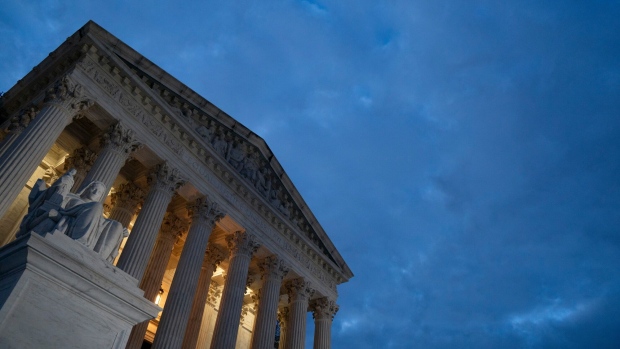Mar 15, 2024
Social Media Blocking Can Violate Rights, Supreme Court Rules
, Bloomberg News

(Bloomberg) -- The US Supreme Court said public officials can sometimes be sued for restricting access to their private social media feeds, ruling in two cases that evoked former President Donald Trump’s efforts to block people from his Twitter account.
The unanimous decisions set up a new test for determining whether officials effectively convert their private websites into government sites — making them subject to constitutional requirements — by using them for public business.
Writing for the court, Justice Amy Coney Barrett said officials can be sued when they have authority to speak for the government on certain topics, post about those subjects on their private accounts and then delete comments from members of the public. She said judges should look at the facts of each case to determine whether a suit can go forward.
“While public officials can act on behalf of the state, they are also private citizens with their own constitutional rights,” Barrett wrote.
The cases are part of a Supreme Court term that promises to reset the legal rules for social media. The justices on Monday will review a ruling that would restrict contact with social media companies by the White House and agencies including the Federal Bureau of Investigation.
In two other cases, the court is considering the constitutionality of Republican-backed Florida and Texas laws that would sharply limit the ability of the largest social media platforms to police political misinformation.
School Board
The new rulings stem from cases in California and Michigan. In one, San Diego-area school board members Michelle O’Connor-Ratcliff and T.J. Zane opened Facebook and Twitter accounts during their 2014 campaigns, then continued using the sites to talk about school issues after winning election and taking their seats. They set up their pages so that their posts were open to comment by members of the public.
Two of their constituents, Christopher and Kimberly Garnier, left frequent comments criticizing the board over racial issues and alleged financial wrongdoing by a top school official. O’Connor-Ratcliff and Zane began hiding or deleting the Garniers’ comments before eventually blocking them from commenting altogether.
The second case concerned James Freed, who was hired in 2014 to serve as the city manager of Port Huron, Michigan. Freed used his Facebook page to post both family and professional information. His posts in 2020 about the Covid-19 pandemic drew a series of critical comments from Kevin Lindke, whom Freed eventually blocked.
Federal appeals courts reached opposite conclusions in the two cases. The San Francisco-based 9th US Circuit Court of Appeals said the two school board members violated the First Amendment, while the Cincinnati-based 6th Circuit tossed out Lindke’s lawsuit against Freed. The Supreme Court sent both cases back to the lower courts for reconsideration.
The Biden administration backed the government officials at the Supreme Court, characterizing the Facebook and Twitter feeds as private property.
The central question for the high court was whether the officials’ social media activities constituted “state action,” making them subject to the First Amendment.
Trump faced similar legal issues while president when he blocked critics from following his Twitter account. A federal appeals court ruled against Trump, but his 2020 reelection defeat meant the case lost its practical impact before the Supreme Court could get involved.
Barrett hinted that Trump probably would have lost that legal fight. She wrote that blocking users from commenting on “a page-wide basis” was potentially more problematic than just deleting particular posts. And in a footnote, she cited the Trump case as going even further, saying that a blocked Twitter user “is unable to see, reply to, retweet, or like the blocker’s tweets.”
Blocking people from otherwise public Facebook pages means they can’t comment on posts but can still view them. Blocking users on X, as Twitter is now known, means they can’t see the account while logged in.
The cases are O’Connor-Ratcliff v. Garnier, 22-324, and Lindke v. Freed, 22-611.
(Updates with excerpt from opinion in fourth paragraph.)
©2024 Bloomberg L.P.





